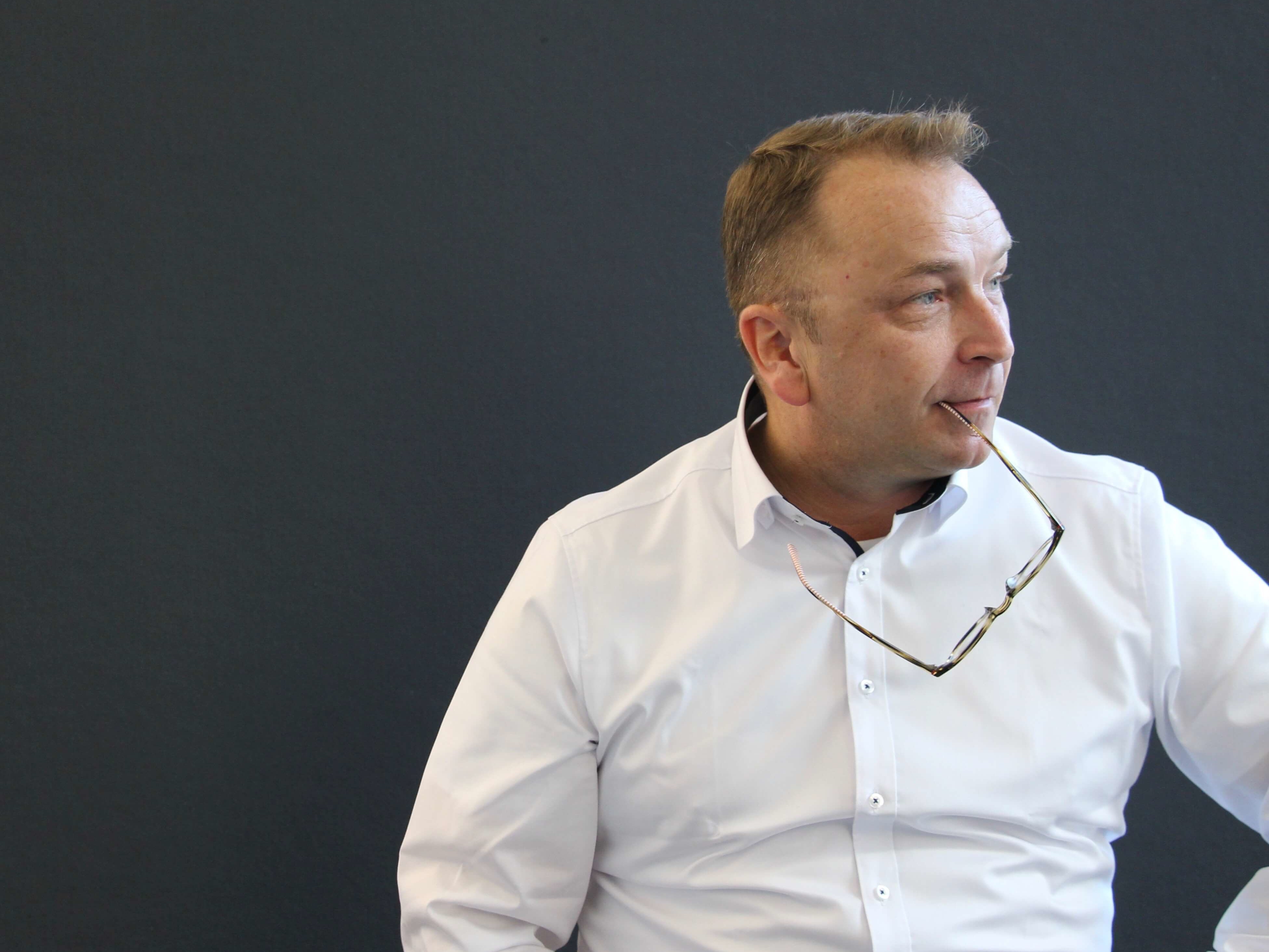
managing tomorrow: leadership in future corporate culture
by Melanie wimmer
In our white paper entitled “Future Corporate Culture,” we ask whether a transformation process at a company is open-heart surgery and how companies can find the right balance for their company culture. Do the managers of the future also need to undergo this “open-heart surgery”? What will management style look like in the future? And how do executives guide employees through the change successfully?
An interview with our two rpc coaches, Luc Pirard from Belgium, a specialist in international management training and business coaching, and Bengt König from Germany, who has over 30 years experience at a car dealership, including as head of sales and as a manager.
Leadership style with a future
An interview with our rpc coaches, Luc Pirard from Belgium, a specialist in international management training and business coaching, and Bengt König from Germany, who has over 30 years of experience at car dealerships, among other roles, as head of sales and as a manager.
What challenges do managers face today?
Bengt König: Managers are confronted with constant change. They need to be aware of and understand new changes such as digitalization and bring them to the level of the employees. Around them, everything is changing, but often they do not change themselves. And if they don’t go along with it, they will lose eventually. Establishing this mindset is difficult.
Luc Pirard: But managers these days are still too operationally driven to distance themselves and think strategically. The problem is that managers don’t focus enough on employees and hardly focus on themselves at all. In principle, it should be the other way around. The final dimension, the individual person and character, should not be neglected either. First of all, they need to know “Where do I want to go?” and “How do I need to organize myself?” Then, they will also have time to deal with the more important issues in their business and with HR management. It is necessary to find the right balance here.
Luc, what do you advise managers to do in this case?
Luc Pirard: First of all, to set the right objective. “What is the corporate objective and what is my own objective?” This will show the priorities. Executives need self-reflection to know where they want to go. When it comes to the implementation, the key question is “How do I translate the objectives for my employees?” Awareness of the own management style and self-motivation play a key role. Then they can steer themselves, their business and their team in the same direction.
Let's talk about a specific change—digitalization. What does this trend mean for managers?
Luc Pirard: For me, digitalization is not an end in itself, but a way or a means. Managers should use it to simplify, accelerate and optimize processes. Doing this, they should see the bigger picture: How does it all fit together? How can we work together across departments? Overcoming silos is one of the biggest challenges of our time.
Bengt König: The relationship with employees is changing with the advent of digitalization. Managers will have no choice but to manage in a more agile way and give employees more scope for their own creativity. Outdated communication methods are a particular challenge here, for instance.
What is the best way for managers to deal with the challenges of digitalization and digital transformation?
Bengt König: They must be open to new media—such as the use of apps—and be able to convey information in a targeted way. In addition, new digital technologies and channels should enable employees to quickly and easily obtain information themselves. Executives, therefore, provide greater flexibility, break down old approaches and reduce their own workload. Consequently, both sides are focused on working on themselves so that they can address new challenges systematically. Employees gain more transparency, while managers see an increase in trust. Discussions can be initiated in a targeted way to further develop the relationship.
These days, we often do not tend to speak of specific changes, but constant change instead. What does this mean for managers?
Bengt König: They do not have to follow every single trend. A manager must be able to assess whether certain changes are actually useful for their own company. I would ask: What do we need to solve? What provides the most added value for us—and ultimately also for our customers?
Luc Pirard: Too many changes wear out employees, who usually see change as a bigger workload. They need to understand what is in it for them personally. One question that is constantly asked is: “What is the objective?” That is entirely natural. We’re all only human and are afraid of the unknown. Therefore, managers must show employees the vision and the path to achieving the change.
How can managers help employees to handle future changes?
Luc Pirard: Employees must be able to believe in and trust executives. The managers’ job is to find out the reasons why employees resist change and counteract. This requires discipline on their part, and they should also ask the same of their employees. Parents are familiar with this: If you give children no structure, chaos reigns at home.
Bengt König: Many employees are caught up in their day-to-day business. Here, the manager’s job is to help employees deal with the new challenges through communication and trust. This also includes minor changes, such as using a tablet instead of pen and paper. Some employees are technology-friendly and have no problem with this—but for others, it presents a major challenge. Coaching approaches enable managers to create an involvement with and, in particular, understanding of the change by clearly demonstrating the added value for them and their customers. Employees who are convinced by the change can act as “change ambassadors” to clearly convey the advantages and overcome the new challenge in conjunction with their colleagues.
Why is management such an important topic, particularly today?
Luc Pirard: Growing numbers of employees are resigning because of their managers. The main reason given is a lack of trust of their supervisors, regardless of whether the manager and the employee are male or female, young or old. Yet, managers often can’t see the wood for the trees. “How do I manage my employees?” and “How do I delegate properly?” are questions that we are constantly asked as coaches.
The Germans have a saying: “Trust is good, supervision is better.” Therefore, many managers micro-manage instead of delegating. But as a manager, you don’t need to understand everything right down to the last detail. Know your employees’ strengths and build on them. And accept mistakes—because lessons can be learned from them. My attitude to life is “Every downside has an upside.” See the positive side.
How can managers identify what management style is right for them?
Bengt König: There is no one-size-fits-all management style. Obviously, a manager should bring certain properties to the table such as respect, openness to new things, transparency and honesty. However, the style depends on the environment. I would have to manage differently in a start-up than in the army.
Luc Pirard: You should always concentrate on your own employees above everything else. Talk to your employees, get to know them, and always engage with the various personalities. In general, these days, transformational management, rather than transactional management, is important. Think outside the box; focus on vision and innovation. You are a role model, you inspire, develop and challenge your employees. To me, that is the management style of the future.
Can managers fundamentally adapt their management style if a change requires this?
Bengt König: The crucial factor is who is triggering it. If someone wants to impose a specific management style, it is likely that no change will be possible. However, if the change comes from the manager or if the will is there, this is possible. A clear strategy is important.
A transformation process in a company, especially a culture change, seems like open-heart surgery. Do you think this image also applies to a change of management style?
Bengt König: Yes, definitely. You need to make a clear decision: What am I allowing in the open-heart surgery? Where am I making the incision? Coaches should be used as surgeons in order to assist with the operation, or the change. We also go into personnel diagnostics. Are you the type for this style? After all, the most important thing is to be authentic. Make the incision in only one of the ventricles—right or left.
At rpc, we help managers to use the right tool for this in order to work on enhancing the manager’s own style.
What defines you as rpc coaches?
Bengt König: At rpc, we are eager to speak our customers’ language and convey our solution clearly on equal terms. We speak the language of the owner and the managers, but also the language of the mechanics. We are practical and from the grassroots.
Within rpc, we create synergies by incorporating not just coaching, but also our experiences in the fields of consulting and training. In other words, we provide an “all-inclusive package” and apply innovative approaches to help customers handle change successfully.
What advice would you like to give to the managers of the future?
Luc Pirard: Management is passion. Start to understand what motivates people. To me, individualizing is the most important thing. There is only “the employee” and not “the employees”.
Bengt König: As a father, one image comes immediately to mind: Act like SpongeBob! Absorb new knowledge like a sponge and implement it in your management style. But don’t make any fundamental changes to who you are. Always stay authentic.
This interview was also published on LinkedIn.
Bengt König
Bengt König has been a successful consultant since 2011, drawing on many years of experience as a manager in the automotive sector. He accompanies organizations with the issues of strategy, planning, and management. As a coach, he provides support with his expertise in the fields of change management and process optimization.
Luc Pirard
Luc Pirard is a senior manager at rpc, and has many years of strategic and operational managerial experience at companies with a branch structure. As a coach, he specializes in training and coaching for leadership forums, management trainings, as well as strategy and post-merger consulting in retail.
contact our coaching partner

Erik Bellendir
PartnerErik Bellendir is partner and founding member of rpc. He heads-up our global retail performance coaching division and is responsible for the rpc office in Great Britain. He also leads the commercial vehicle industry experts group. Erik draws on his experience as a specialist for global sales performance programmes, as well as his tenures in retail, sales, adverting and marketing.
resilient leadership
Read more...a fitness plan for digital transformation
Read more...anti burnout coaching
Read more...







